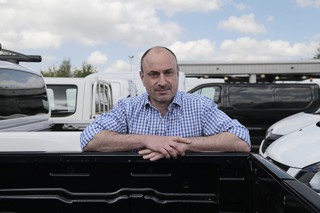By Richard Dilks, chief executive of CoMoUK, the UK’s national charity for shared transport
While COP29 takes places this week and global temperatures continue to climb, it is abundantly clear that meeting the UK’s emissions reduction targets will require an acceleration of efforts across all sectors of society, and that includes those responsible for managing fleets of cars used by businesses and their employees every day.
The first ever Sustainable Mobility Week run by Fleet News could hardly be more timely, so it is welcome to be able to contribute my thoughts as chief executive of Collaborative Mobility UK (CoMoUK), the UK’s national charity for the public benefits of shared transport such as car, bike, lift and scooter sharing schemes.
These are at all-time highs of popularity across the country as people seek cost-effective and convenient ways of moving around with a reduced carbon footprint.
Membership of UK car clubs now stands at more than 780,000, while around 67,000 trips are made through bike share schemes every day. In the English e-scooter trials that began in 2020, more than 47 million rides had been taken by April this year.
Our research has shown that people who use shared transport enjoy a raft of benefits. As well as reducing their own carbon footprints, they are improving their mental and physical wellbeing and saving money.
There are important wider knock-on effects too, from freeing up space taken up by private cars in towns and cities to cutting traffic congestion and improving air quality for all.
For businesses, there are clear advantages associated with helping employees make greater use of shared transport, including cutting costs for employers and employees, the opportunity to free up space taken up by private cars in car parks and the ability to bear down on direct and indirect emissions.
Of particular relevance to fleets are car sharing via car clubs on closed (employee-only) or open formats and lift sharing, also sometimes called car pooling. Both rethink the role of the car away from a sole-access model, which boosts efficiency while cutting costs and emissions.
There are important potential co-benefits to be had where employers can use shared cars as pool fleet, but then open them up to the local community outside work hours – there are a number of examples of this good fit layering up of demand, but we would love to see more.
Relatedly, we have also seen some closed loop employee shuttles expand over time into being open to non-employees too, even helping start on-demand publicly available bus schemes.
As well as saving staff money and improving their wellbeing, such schemes can reduce on-site parking pressures, as fewer parking spaces are needed, as well as cutting traffic congestion and help businesses reduce their environmental impact.
In terms of infrastructure, there is also an opportunity for businesses to share existing charging points for electric vehicles (EVs) with local communities, or come to mutually beneficial agreements on the placement of strategic hubs where there might be gaps in provision.
Interchange with public transport can be an important feature by connecting people’s homes and workplaces with public transport hubs such as railway stations, allowing them to travel great distances without defaulting to the use of a private car.
Wherever possible, businesses should be providing staff with the information, tools and incentives they need to take advantage of shared transport schemes operating in their area, so it is as easy as possible for them to make the switch.
There is much work to be done. Despite more people embracing a ‘car light’ lifestyle, surface transport is the highest emitting sector in the UK, responsible for 23 per cent of our greenhouse gas emissions in 2022. Its emissions have remained stubbornly high while other sectors’ have fallen.
The Climate Change Committee acknowledged in a report last year that a move to lower carbon modes of travel, including shared transport, is an important means of reducing car demand, but that “there has been little progress on this to date”. It is up to all of us to make up for lost time.























Login to comment
Comments
No comments have been made yet.